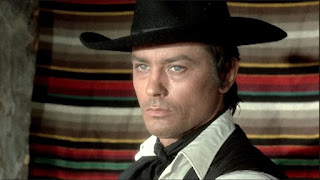Directed by
Terence Young; produced by Ted Richmond
In 1870, Japan is
at last establishing diplomatic relations with the rest of the world, and its
new ambassador to the United States is travelling by rail across the west when
his train is robbed by violent bandits, led by Link Stuart (Charles Bronson).
Along with $400,000 in cash, his partner Gauche (Alain Delon) also steals a
sword the ambassador intends for the American president. Betrayed by Gauche and
left for dead, Stuart reluctantly teams with samurai warrior Kuroda Jubei
(Toshiro Mifune), one seeking the money, the other the sword, and both hunting
Gauche.
Red Sun had a head start in several categories.
Nowhere else are you going to find Bronson, Mifune and Delon together in a
film: each was a cinematic power at the time in his own country (Bronson
popular in Japan, to boot). The notion of a Japanese warrior teaming with an
American gunslinger was filled with potential. Terence Young had directed the
first two James Bond films, as well as the effective thriller Wait Until Dark. Yet Red Sun is a disappointment.
The problem is
undoubtedly the script. The story, which could have been handled more
imaginatively, is good, if not very
good. But in the writing, Red Sun
becomes lackluster and mediocre. The script comes from three writers of very
uneven quality (one had written The
Magnificent Seven and would write Major
Payne; another would go on to The
Little Girl Who Lives Down the Lane and Inchon).
Red Sun’s screenplay needed more focus, more insight into character, more
sympathy for its leads.
The writing has
its moments. There is a good scene in which Kurado bitterly laments the passing
of the samurai era in Japan. Indeed, it is Kurado who is by far the more involving
of the duo, and creates an antidote to the stereotype of the cold, austere
samurai. His feeling of empathy for a murdered farmer, his gift of money to a family
and his encounter with a prostitute create interest. But the viewer will
probably sense that it comes more from the actor than his words. On the other
hand, Link Stuart is a murderous criminal, with no remorse for his deeds; he
would have been better as a contrast to the homicidal Gauche, rather than a
comparison.
The dialogue is
bland, and the action is, one might write, unconsidered. Being the Old West,
there is the almost obligatory trouble with Indians. Yet there is no reason
given for this trouble. The aftermath of two Comanche attacks is shown, while
the climax involves a third. Why? Soldiers encountered at the movie’s beginning
give no hint of a war with the Comanches, no clue that they may be raiding. And
surely there was a better tactician in the tribe than the one who suggested an
assault on a collection of buildings should consist largely of riding around it
in circles.
The production
values seem rather low. In particular, the Comanches appear garbed in cast-offs
from half a dozen other films, only a few of which were westerns. Stuart and
Kurado’s trek through the desert is rather dull, with no good photography to
enliven it. A journey of several days through some severe yet beautiful lands
should have begged for well-chosen scenery, finely executed photography, yet it
looks little different than what is offered in the average 1970s tv series with
a similar setting.
The performances are
good, though together, Bronson and Mifune have little chemistry. It might have
been more enjoyable had Delon been included as a third partner, and not the
quarry. Having him from France, instead of New Orleans, as Gauche is, may have
given Red Sun all sorts of
possibilities. Then again, if the film can’t take advantage of a samurai and a
gunfighter together, anything else might have been pointless.
Red Sun had promise, but squanders it in a half-hearted script and wasted scenes.










































